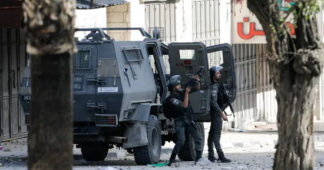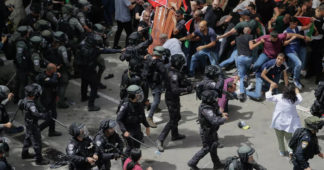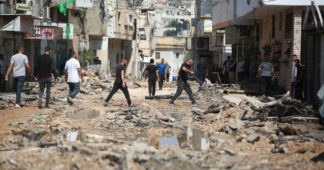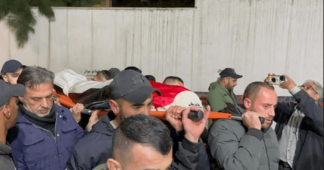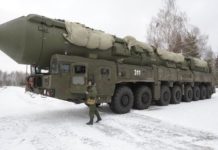Israel is continuing an offensive on the West Bank city of Jenin that analysts say is meant to appease the settler movement as it pushes the government to exert more control over the occupied territory in preparation for annexation.
On Thursday, the Israeli army continued its offensive on the Jenin refugee camp in the north of the occupied Palestinian West Bank for the third consecutive day. The offensive, dubbed “Iron Wall” has killed 10 Palestinians so far, and left at least 40 wounded.
Israeli forces launched its offensive on Jenin early on Tuesday with air strikes on the refugee camp as well as an incursion by special forces, positioning snipers overlooking the camp. This initial attack was soon followed by large armored forces from the northern, eastern, and western sides of Jenin, accompanied by helicopter gunships that opened fire on Palestinians from the air, and Israeli D-9 bulldozers which destroyed streets and other already-damaged infrastructure.
The first moments of the attack were “the most difficult moments,” a resident of Jenin who asked not to be named, told Mondoweiss. “People were completely taken by surprise, as the airstrikes happened while many were going back home, and all the victims that were killed so far were civilians,” they recounted.
“The occupation army sealed off the entire camp, before opening one exit from which residents can cross back and forth only from 9:00 a.m. to 5:00 p.m.,” they added. “People who enter and exit can do so only in groups of five people maximum, and they are searched, and many have been arrested, including several women.”
The Israeli offensive began a month after the Palestinian Authority started its own operation in Jenin, aimed at regaining control from the local resistance groups. The PA and the Jenin Brigade reached an agreement a week ago through the mediation of many Palestinian political and civil society figures, but the clashes between the sides resumed last Sunday and continued until Tuesday morning, when Israel began its attack on the camp.
On Wednesday, the Palestinian police raided al-Razi hospital in Jenin city, during the Israeli attack on the camp, and arrested two Palestinians who were being treated there.
“The people in Jenin aren’t actually surprised by the Israeli attack, because they have survived many similar attacks in the past years,” said the resident. “They are in shock and anger because it is the first time that a Palestinian security operation coincides with an Israeli attack, and we are still trying to understand what is happening,” they went on.
The spokesperson of the Palestinian security forces, Anwar Rajab, said on Monday that the Palestinian security forces withdrew from Jenin when the Israeli offensive began “to avoid a direct confrontation with the Israeli army.”
Israeli forces also closed and bulldozed the street that leads to the Jenin public hospital, the resident explained. This now forces people to go through the camp, be searched, and make a much longer trip to access the hospital through an alternative entrance.
“This is the first time that the occupation forces blocked direct access to the hospital,” Dr. Wesam Baker, director of the Jenin public hospital, told Mondoweiss. “Occupation forces raided the surrounding area of the hospital today, on the third day of its attack on Jenin, and searched the outside of the emergency section,” he pointed out.
“We received at least 10 wounded so far, mostly wounded in the lower limbs, and some were seriously wounded, and we also received four killed,” he went on. “Our staff is making several days long shifts, and only today we were able to release some of our staff and bring others to replace them,” he added.
Israeli war minister Yisrael Katz said the attack on Jenin “will change Israel’s concept of security in the West Bank,” adding that “Jenin is only the beginning,” and that there will be “more [Israeli] operations in other parts of the West Bank.” The Israeli army said in a statement that its attack on Jenin aims at “dismantling terrorist infrastructure,” in reference to the Jenin Brigade, the local resistance group that has been confronting Israeli raids to Jenin since late 2021.
West Bank closure
Katz had already announced military preparations for “wide operations” in the West Bank, shortly after the ceasefire agreement in Gaza was announced, with the aim of “changing the security situation” in the West Bank, according to Katz. The offensive came simultaneously with a series of resignations in the leadership of the Israeli army, including the Israeli army’s chief of staff and the commander of the Israeli army’s southern front, both of whom said that they resigned for their failure to avoid the October 7 attack.
Israel’s Finance Minister Bezalel Smotrich, who also serves in the Israeli war cabinet, has also recently said that the Israeli army’s leadership will be replaced in order “to resume the war in Gaza.”
Meanwhile, simultaneously with the offensive on Jenin, Israeli forces also imposed a strict closure across the West Bank since last weekend. Starting Saturday, the Israeli army erected at least 17 metal gates at the entrances of towns and villages across the West Bank, cutting off Palestinian communities from one another, and greatly impeding the freedom of movement across the occupied territory. On Sunday, many Palestinians who left Ramallah in the afternoon reported arriving at their homes in Nablus, one hour drive away, at 2:00 a.m. In Hebron, a Palestinian woman, Iman Jaradat, 45, died from a heart stroke at an Israeli checkpoint northeast of Hebron, on her way to the hospital.
Israeli far-right politicians, largely supported by the West Bank settlers’ movement, have been calling for imposing checkpoints and restricting Palestinians’ freedom of movement since before October 7, 2023. The recently-resigned Israeli security minister and far-right settler, Itamar Ben-Gvir, said in the early days after October 7 that “the lives of settlers [in the West Bank] are more important than the freedom of movement of Palestinians,” arguing that checkpoints would limit Palestinian attacks on settlers.
Political expediency and opportunity
Itamar Ben-Gvir resigned from the Israeli government in protest of the ceasefire deal in Gaza. His ally, Bezalel Smotrich, who also voted against the deal in the Israeli war cabinet, did not resign but threatened to resign if Israel didn’t resume the war after the end of the first stage of the deal in six weeks. Smotrich’s resignation would provoke the collapse of the government coalition led by Benjamin Netanyahu and force fresh elections.
Many analysts are considering the Israeli escalation in the West Bank a politically motivated action by Benjamin Netanyahu’s government to appease Smotrich in exchange for his acceptance of the ceasefire deal, in order to save his government. Smotrich has been pushing for the past years for the full annexation of the West Bank, and calling for mass expulsion of Palestinians. Earlier this month, he said, addressing Israeli settlers, that Israel should wait for the inauguration of Donald Trump before moving to more direct annexation moves.
Last November, Smotrich stated that 2025 would be the year of Israel’s annexation of the West Bank. The Israeli attack on Jenin began the day before Donald Trump’s inauguration, and the severe restrictions on Palestinians in the West Bank came just a few days after the Gaza ceasefire went into effect. These are all signs that Israeli settlers and their leaders may be taking advantage of Benjamin Netanyahu’s current need for political cohesion, as well as the expected support by the new U.S. administration, in advancing their annexation project in the West Bank.
We remind our readers that publication of articles on our site does not mean that we agree with what is written. Our policy is to publish anything which we consider of interest, so as to assist our readers in forming their opinions. Sometimes we even publish articles with which we totally disagree, since we believe it is important for our readers to be informed on as wide a spectrum of views as possible.
